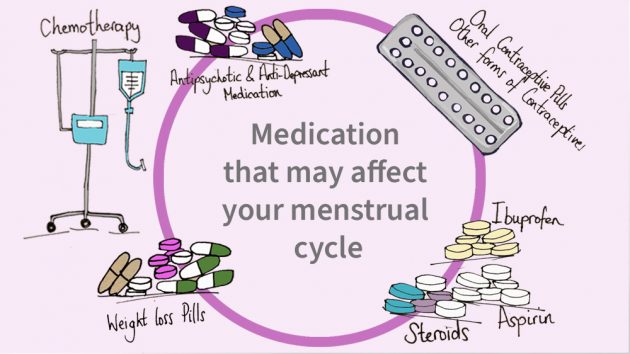
Medication That May Affect Your Menstrual Cycle
Many different medications can affect the menstrual cycle. In this article Consultant Gynaecologist Mr Pisal explains how medications can effect cycle regularity, period pain and stop periods altogether. However, it is always important to consider other causes of menstrual irregularities such as pregnancy or polyp. So if your symptoms are unexpected or troublesome, please see your GP or gynaecologist for an assessment.
Oral Contraceptive Pills:
The ‘pill’ usually has a positive effect on the menstrual cycle. It makes the cycle regular and periods less heavy and less painful. Hence, the pill is often used as a therapeutic intervention for conditions such as endometriosis, heavy or painful periods. Occasionally taking the contraceptive pill can lead to break-through-bleeding between periods.
Aspirin:
Aspirin in theory can increase the amount of bleeding during a period, but in practice this effect is minimal. It is also not particularly effective at reducing the period pain.
Ibuprofen:
Ibuprofen is excellent for reducing period-related pain and does not affect the amount of bleeding.
Antipsychotic and Anti-Depressant Medication:
This type of medication can sometimes lead to absent periods or infrequent periods with longer a menstrual cycle (35 days instead of 21 days for example).
Weight Loss Pill:
A sudden change in weight can also affect menstrual cycle. Diet pills are known to cause irregular periods. A body fat percentage less than 17% can also affect menstrual cycle and lead to a lack of periods (as in many Olympic athletes).
Chemotherapy:
Chemotherapy can lead to premature menopause and hence no periods. But sometimes the ovaries can recover and periods can resume normally. Your doctor will often recommend that you see a fertility specialist before starting chemotherapy if you wish to preserve your fertility.
Steroids:
Steroid medications such as prednisolone can affect periods and make them irregular, prolonged and sometimes heavier. This is usually after long-term use of steroids.
Other forms of Contraceptives:
Contraceptives other than the oral pill can also affect the menstrual cycle. The non-hormonal intrauterine devices (IUD, Copper-T) can lead to bleeding between periods. Whereas hormonal IUDs (Mirena or Jaydess) secrete a small amount of progesterone within the uterine cavity and will often lead to lighter and less painful periods. Sometimes the periods are completely blocked. Irregular bleeding in the first few months is also a common side effect. The injection pill, implant and minipill all contain progesterone and often lead to absence of periods. Irregular unpredictable bleeding is a known side-effect.
Make an appointment
Although different kinds of medication have been found to affect the menstrual cycle, if you are experiencing any symptoms or abnormalities which you are worried about, don’t hesitate to contact your GP or gynaecologist, or give us a call on 0207 10 11 700. At London Gynaecology, we have locations at The Portland Hospital and at our new opening in the City of London. To book a consultation please email our team on [email protected] or call the number above.


